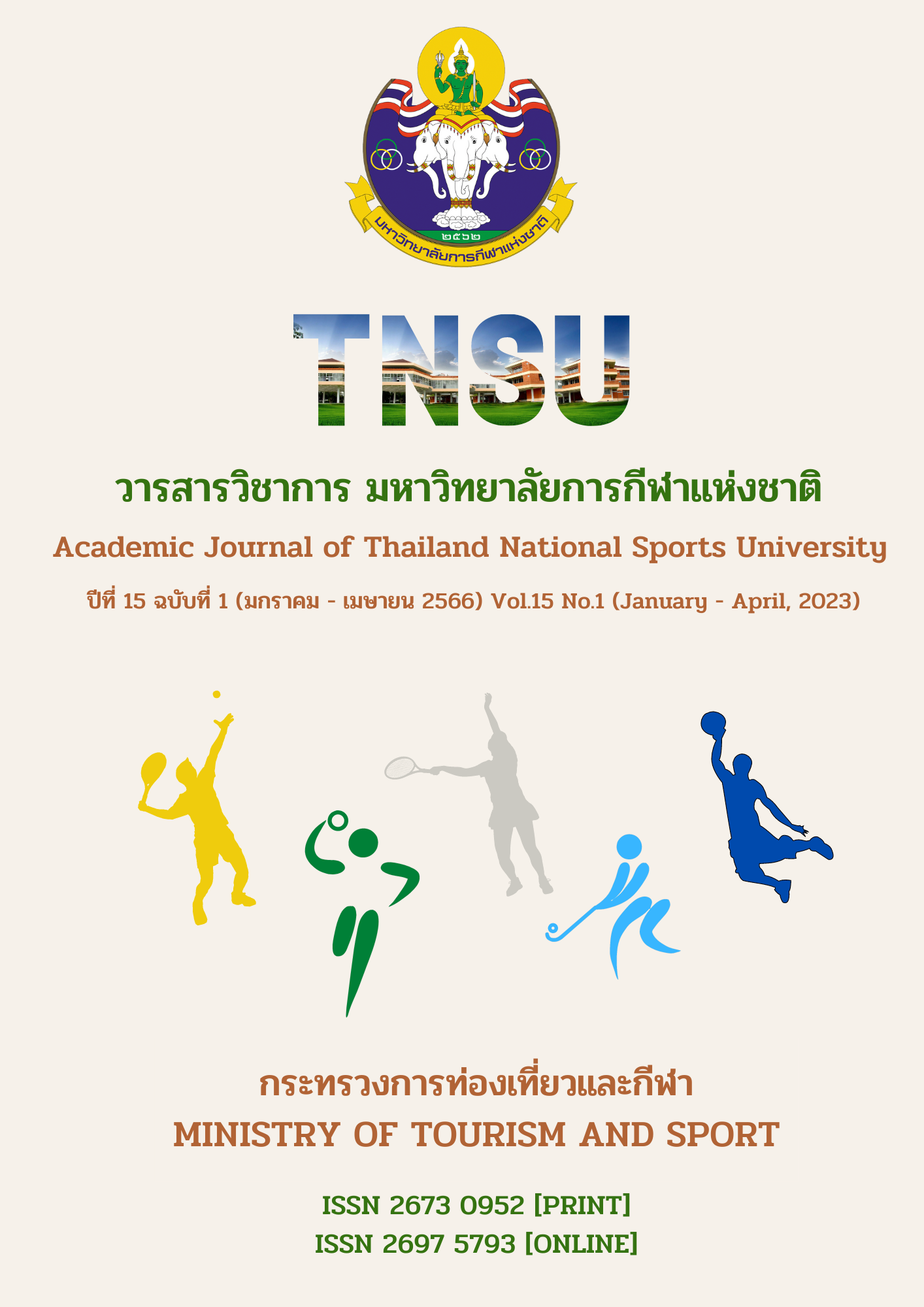EFFECTS OF PHYSICAL EDUCATION LEARNING MANAGEMENT ON LEAD - UP GAMES ON MOTOR FITNESS OF PRIMARY STUDENTS
Main Article Content
Abstract
Purposes: 1) to compare the average of motor fitness test results of the experimental and the control groups before and after implementation, and 2) to compare the average of motor fitness test between the experimental and the control groups after implementation. Methods: The samples were 60 students of primary grade 5. Divided into two groups, 30 students in the experimental group received physical education learning management on lead-up games for 8 weeks, 1 day a week, 60 minutes a day and 30 students in the control group received conventional physical education learning management of this study were chosen by simple random sampling method. The research instrument was composed of the 8 plans of physical education learning management on lead - up games have an IOC in each plan with 0.88 and motor fitness test created by the researcher were based on the principles of Kanokwan Anburi (2014) as a guideline to create the motor fitness test, such as speed, power, agility, balance, reaction time, coordination with IOC 1.00, 1.00, 1.00, 1.00, 0.80 and 1.00. The data were analyzed by means, standard deviations and t-test Independent. Results: 1) The average of motor fitness test of the experimental group after the treatment were significantly higher than that before treatment at a .05 level. 2) The average of motor fitness test of the experimental group after the treatment were found significantly higher than that of the control group at a .05 level.
Article Details

This work is licensed under a Creative Commons Attribution-NonCommercial-NoDerivatives 4.0 International License.
The published article is a copyright of the Academic Journal of Thailand National Sports University. The passage appeared in each article in this academic journal is a perspective of each author which is not related to the journal. Each author is required to be responsible for all components of his/her own article. If there are any mistakes, each author must be responsible for those mistakes on his/her own.
References
Brittany, & Sherry. (2018). Learn to love lead - up games packet. Retrieved from http://online.anyflip.com/ptsj/gapl/mobile/index.html
Dick Moss. (2019). Leadup games for 19 sports & PE activities. Retrieved from https://www.coursehero.com/file/28606423/-Leadup-Gamespdf/
Department of Physical Education, Ministry of Tourism and Sports. (2018). Creative recreation. Retrieved from https://www.dpe.go.th/manual-files-412791791792
Department of Physical Education, Ministry of Tourism and Sports. (2019). Tests and benchmarks of physical fitness elementary school students (7 - 12 years old). Retrieved from https://www.dpe.go.th/manual-files-411291791794
De Leon J., Diyco C., Empleo, Marry Ann Y., Espina, J. R., Galang, J. L., Gana G. G., Garcia, M., Gloria, J. D., & Ingal, S. (2013). Lead - up games for different team sports. Retrieved from https://www.slideshare.net/ceygloria/long-bond-paper-2
Dechnarit Hanrojjanakul. (2010). Effects of physical education activities using Thai traditional games on physical performance in relation to skills of kindergarten children (Master's thesis), Chulalongkorn University.
Falatee Madteh. (2014). The effect of practicing folk games on the development of early childhood. Education in Health and Physical Education Department of Curriculum and Instruction Faculty of Education Prince of Songkla University.
Jintana Sarayutpitak, Sarinya Rodpipat, Jakrin Duangkam, & Wiradee Eakronnarongchai. (2019). Strategies to promoting physical activity of upper elementary school students in Bangkok through administrating school health program. Journal of Sports Sciences and Health, 20(2), May – August. 111 – 125.
Kanokwan Unburee. (2014) The effect of movement program on motor fitness of Prathomsuksa 5 male students at Anubanmuangselaphum School Roi Et Province (Master's thesis), Kasetsart University.
Kittipong Taruwan. (2015). Effects of physical education learning management using Thai folk games for enhancing the needs of physical fitness on accident of fall prevention of elementary school students (Master's thesis), Chulalongkorn University.
Ministry of Education. (2008). Basic education core curriculum, B.E. 2551. Retrieved from http://math.ipst.ac.th/wp-content/uploads/2015/PDF/Curriculum%202551.pdf
Natthawut Sitthichai. (2018). The effect of participation in physical education game activities on elementary school students’ physical self - esteem. Academic Journal Phuket Rajabhat University, 14(2), July – December. 71 – 90.
Natthika Pengli. (2019). Effect of fundamental movement skills program on mechanism skills of early childhood. Journal of Education Chulalongkorn University, 47(3), July – September. 196 - 216.
Office of Recreational Promotion and Development, Department of Physical Education. (2020). Loworgaingtion games. Retrieved from http://164.115.27.97/digital/items/show/9412
Office of the Health Promotion Foundation (2018). Children must come out to play by sook publishing. Retrieved from http://www.thaihealthcenter.org/campaign/content/detail/42
Panittha Ruangpanyawut. (2013). Effects of physical education learning management using Thai folk games on the health and performance of primary school students (Master's thesis), Chulalongkorn University.
Sakchai Srisuk, Jirachai Karawa, Watthanapong Khongsebsor, Sujira Hongsamanut, Suttirak Wisetsung, & Narisara Premsri. (2018). Effect of physical activity program on health-related physical fitness among grade 4 – 6 students in Ban – Don - Yanang School, Nakhon Phanom Province. Nakhon Phanom University Journal, 8(3), September - December. 1 – 8.
Sirichai Phetanaj, & Somkiat Netprasert. (2015). Motor fitness and body mass index among primary 4 - 6 students from a group of municipal schools in Nakhon Sawan Municipality. Journal of Graduate Studies in Northern Rajabhat Universities, 5(8), January – June. 107 - 118.
Thai Health Promotion Foundation. (2016). Thailand Recommendations on Physical Activity, Non - Sedentary Lifestyles and Sleeping for School Age and Teen (6 - 17 years old). Retrieved from https://www.thaihealth.or.th/Books/516/ข้อแนะนำการส่งเสริมกิจกรรมทางกายการลดพฤติกรรมเนือยนิ่ง%20และการนอนหลับสำหรับวัยเรียนและวัยรุ่น%20(6-17%20ปี).html
Wattana Panich Publishing House. (2016). Increase movement skills, grade 4. Retrieved from https://www.trueplookpanya.com/learning/detail/31776
Wattanapong Aunnum. (2011). Effects of Thai traditional games on mechanical performance of male students grade 4 – 6 (Master's thesis), Srinakharinwirot University.
Worasak Pianchob. (2005). Includes articles on philosophy, principles, teaching methods, and measurement for evaluation in physical education. Bangkok: Chulalongkorn University Press.


